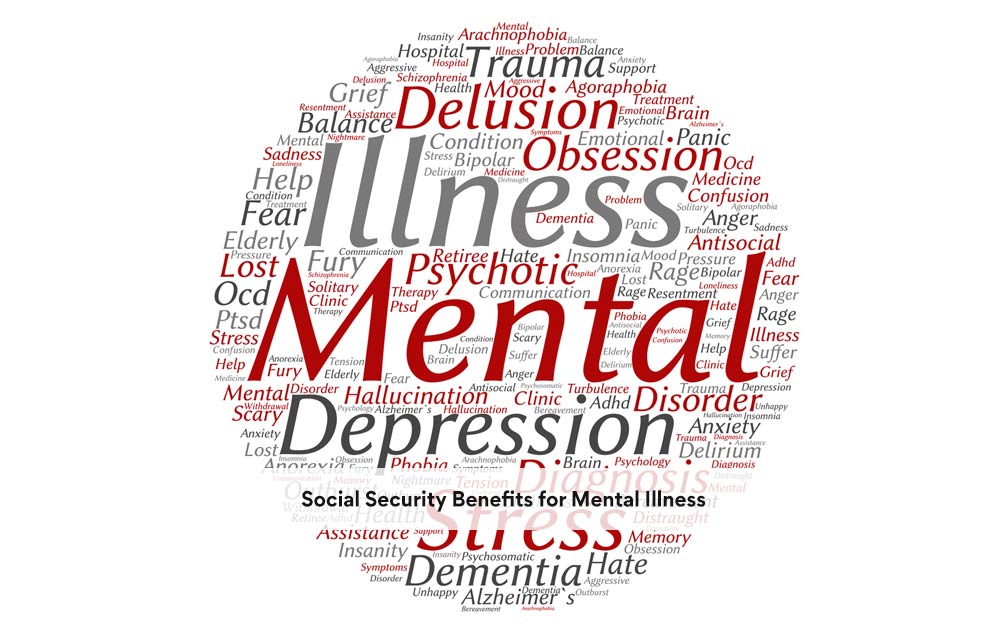Social Security Disability Insurance (SSDI or SSD) is the sole source of income for millions of Americans who are unable to work due to a non-work-related injury or illness. SSDI benefits are available only to workers and former workers with a substantial employment history.
Both physical and mental disabilities are covered under the Social Security Act. While SSDI pays the same benefits for qualifying mental impairments as it does for physical impairments, the amount each individual receives in benefits depends on their history of earnings.
This blog post will explain how Social Security defines qualifying disabilities, including mental impairments, and determines each individual’s benefit payment. At The Clauson Law Firm, we know how important it is for every disability applicant and benefit recipient to understand how their benefits are arrived at, what affects their continued benefits, and how their benefits can change over time.
Contact Clauson Law today if you have questions about qualifying for SSDI benefits or need help filing a claim or appealing a denial. We’ve helped thousands of disabled people across the U.S. with their disability claims.
Mental Impairments and Social Security Disability
More than 40% of SSD cases in the United States have some mental health or intellectual impairment as a component in the claim. Mental health impairments can result from an almost unlimited array of circumstances, including traumatic stress; depression; genetic predisposition to depression, bipolar disorder, or schizophrenia; or traumatic brain injury (TBI); one of the many forms of dementia; and others.
The ways in which mental impairments affect the person suffering can often interfere with their ability to perform work on a regular basis. These are discussed in detail in the section “Common Mental Disabilities that May Qualify for SSDI” below. But first, let’s look at how you qualify for SSD benefits and how your benefit amount is determined.
Qualifying for Social Security Disability
The Social Security Administration (SSA) works with its own definition of a “disability” to ensure that everyone’s claim is assessed using uniform criteria.
The SSA defines a “disability” as a medically determinable physical or mental impairment that lasts or is expected to last 12 months (or result in death) and prevents the person from performing substantial gainful activities.
Substantial gainful activities are the SSA’s measure of whether a person claiming disability benefits can work enough hours to earn a designated amount of wages or income. In 2023, an SSD claimant must be unable to make more than $1,470 monthly. Those who make more, or whom the government deems fit enough to earn that amount in some occupation, are ineligible for SSD benefits.
Do You Have Sufficient Work Credits
Social Security Disability Insurance benefits are paid from a pool of money that all working taxpayers contribute to throughout their working lives. Employees who receive regular paychecks have FICA contributions withheld by the government. Employers and employees split the cost equally. Self-employed taxpayers must pay the entire amount themselves.
For each quarter of a year in which a person earns $1,640, they earn 1 work credit. Workers can accumulate up to 4 work credits per year. It generally requires 40 work credits to be eligible for SSDI benefits, 20 of which must be earned in the last 10 years. Younge workers who become disabled before accumulating that number of work credits can qualify with a different measure of credits.
Calculating Your SSDI Benefits Payment Amount
The Social Security Administration (SSA) uses a formula to find the benefit amount each individual disability claimant can receive. The SSA finds the worker’s 35 highest-earning annual taxable incomes and then indexes them to adjust for the increase in the cost of living.
Then the government adds the 35 indexed annual incomes it found and divides by 35 to determine the worker’s average indexed annual earnings. Finally, that figure is divided by 12 to find a key amount, the Average Indexed Monthly Earnings (AIME).
Next, the worker’s AIME is run through the following formula:
- Add 90% of the first $1,115 of the AIME, plus
- 32% of the AIME amount between $1,115 and $6,721, plus
- 15% of the AIME above $6,721.
- Then round down to the nearest $0.10 unless already a multiple of 10.
The figure produced by this formula is the amount of the SSD claimant’s monthly benefit payment, called the Primary Insurance Amount (PIA).
Example # 1: Suppose the worker’s Average Indexed Monthly Earnings (AIME) were $6,500. Their monthly SSD benefit amount would be determined like this:
- Add 90% of the first $1,115 of the $6,500 AIME = $1,003.50, plus
- 32% of the AIME between $1,115 and $6,721 = (6,721 – 1,115 = 5,606) $5,606 x .32 = $1,793.92, plus
- 15% of the AIME above $6,721 = $0.00 (AIME is only $6,500)
- Add $1,003.50 + $1,793.93 + $0 = $2,797.42 rounded down to nearest $0.10 = $2,797.40
In this example, the worker’s monthly SSD benefit payment amount would be $2,797.40.
Example # 2: Suppose this worker’s AIME figure was $8,000.
- Add 90% of the first $1,115 of the $8,000 AIME = $1,003.50, plus
- 32% of the AIME between $1,115 and $6,721 = (6,721 – 1,115 = 5,606) $5,606 x .32 = $1,793.92, plus
- 15% of the AIME above $6,721 = (8,000 – 6,721 = 1,279) $1,279 x .15 = $191.85.
- Add $1,003.50 + $1,793.93 + $191.85 = $2,989.27 rounded down to nearest $0.10 = $2,989.20.
In the second example, the worker’s monthly SSD benefit payment amount would be $2,989.20.
What Medical Evidence Does Social Security Use to Assess Your Mental Disability?
Your SSD claim package will need to include medical documentation of your mental impairment generated by your treating physician or other healthcare providers. The government needs to determine whether a) your medical records and noted doctors’ observations support the existence of symptoms that meet a qualifying mental disability or b) the impairment is severe enough to prevent you from being able to earn more than $3,627 per month (2023 figure).
The most important evidence the SSD case reviewer will rely on includes these materials:
- Treatment history notes from your psychiatrist, psychologist, therapist, or counselor that record their observations of your feelings and behavior during your visits, such as anger, withdrawn, withdrawal, flat, etc.,
- Test results from mental status evaluations could indicate an inability to concentrate, confusion, memory lapses, etc.,
- Identification of all medications you take, including those you may have taken in the past that may have been ineffective, all noted side effects, and improvement or lack of improvement observed, and
- Admission and discharge records from any inpatient hospitalizations.
Mental Illness and Mental Impairments Qualifying for Social Security Disability
Social Security adopted a comprehensive list of mental health impairments that qualify a person to receive SSD benefit payments. Formally titled “Disability Evaluation Under Social Security,” the SSD’s list of impairments is commonly referred to as the Blue Book of listed impairments.
Just as the Blue Book does for physical impairments, the list includes distinct categories of mental conditions and disorders with specific criteria that indicate a claimant’s impairment is severe enough to qualify as a disability.
Among the illnesses and disorders listed are the following:
- neurocognitive disorders, such as Alzheimer's or traumatic brain injuries
- schizophrenia spectrum or other psychotic disorders
- depressive, bipolar, or related mood disorders
- disorders of intellectual functioning (low IQ)
- anxiety or obsessive-compulsive disorders
- somatic disorders (physical pain without a known physical source)
- personality and impulse-control disorders
- autism spectrum disorders
- neurodevelopmental disorders, such as Tourette's syndrome
- disordered eating, such as anorexia or bulimia, and
- trauma- and stressor-related disorders (PTSD or PTSI).
Is Your Mental Impairment Severe Enough for Social Security Disability?
Merely being diagnosed with one of the above mental impairments is not all that is required to qualify for Social Security Disability benefits. The SSA must determine if your case is extreme enough to prevent you from engaging in substantial gainful activities.
The fact that millions of people who suffer from these same mental disorders and conditions work every day despite their diagnosis means that an SSD benefits claimant’s experience with the mental impairment must be disruptive to their ability to function successfully in a working environment.
If your mental impairment leaves you unable to fulfill the basic duties expected of most employees, then you are more likely to be considered too disabled to maintain steady employment.
Common skills and abilities that employees typically must perform include the following:
- understand and remember information related to your job
- follow directions and control your own behavior at work.
- interact well with others.
- tolerate some stress at work.
- maintain concentration to complete tasks in a timely manner.
- adjust and adapt to changes,
- manage activities of daily living (hygiene, shopping, pay bills, etc.
Cost of Living Adjustments (COLAs)
Remember that your monthly disability benefits payment may change over time. The federal government applies a “cost of living adjustment” or COLA to all government-funded benefit programs each year. This adjustment increases the amount of a benefit recipient’s monthly payment by the rate of inflation that occurred during the previous calendar year.
Recently, the annual COLA increases applied to disability benefit payments have been substantial due to the sharp rise in inflation throughout 2021 and 2022. The COLA applied to benefit payments in 2023 was 8.7%. In 2022, the government applied a COLA increase of 5.9% to the monthly benefit paid to disability recipients.
Rely Only on an Experienced Social Security Disability Attorney
The Clauson Law Firm has been helping disabled people just like you get the disability benefits they deserve every day for many years.
Filing your own Social Security Disability claim can result in unnecessary delays due to incomplete application packages and incorrect information. The Clauson Law Firm professionally prepares your SSD claim package to maximize your likelihood of receiving a benefit approval notice as soon as possible.
If you need help filing an SSD claim or appealing a denial of your claim, contact the Clauson Law Firm today. We can help you wherever you are in the United States.


